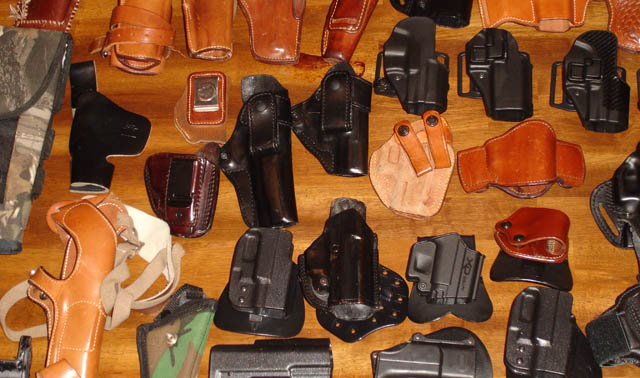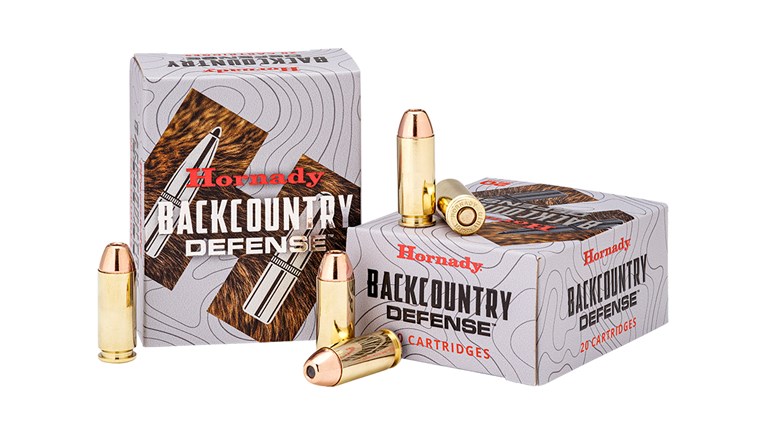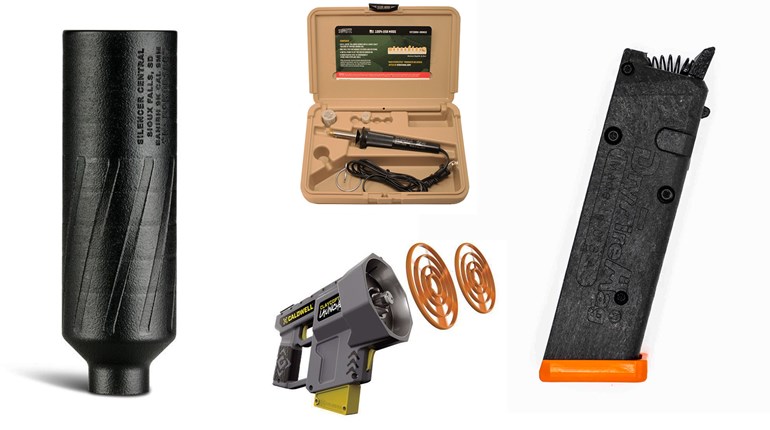
Okay, now that you're comfortable with stance and grip, we get to start thinking about what type of holster—or should I say holsters—would be best for your shooting needs. Presently, there are more types of holsters available on the market today than an old hunting hound has fleas. This is where your actual needs must come into play. Ask yourself: "What will I be using this holster for—shooting practice, concealed carry, hunting or home storage?" I can pretty much guarantee you'll find yourself owning many more holsters than you do firearms. Every handgun owner I know has at least three different types of holsters for each of their guns. It's usually a matter of trial and error until the individual finds one that's perfect for his or her shooting needs. Let's look at some different types of holsters along with their pros and cons.
Shoulder Holsters
Pros: It looks badass (who didn't dig Dirty Harry and his mighty .44 Mag.). Anyway, this type of holster offers excellent retention and easy access from most positions as well as being very comfortable while driving.
Cons: Most shooting ranges will only allow strong-side hip holsters for practice. It is also much slower to draw your firearm from this a shoulder holster in a safe manner, and the use of some type of thumb snap must be employed to keep the firearm seated in the holster in case you trip and fall or have an unforeseeable mishap.
Inside the Waistband Holsters (IWB)
Pros: These holsters combine excellent concealment with the ability to draw your firearm fast. With most IWB holsters, you can count on good retention (keeping the firearm securely within the confines of the holster), which is essential for a secure firearm.
Cons: After wearing an IWB holster for any length of time, you may find it can be very uncomfortable and or painful. Depending on the brand, re-holstering may be hard to accomplish without using your support hand to guide the muzzle into the mouth of the holster, and by doing so you may also inadvertently muzzle your hand and/or body. Lastly, IWB holsters may be difficult to install or remove from your belt.
Pocket, Shirt, Jacket or Vest Holsters
Pros: These garment holsters offer deep concealment, as well as allowing the user to place a hand on the firearm without detection.
Cons: Garment holsters allow the firearm to shift around and can make a smooth draw very difficult. The trigger guard is unprotected, unless the use of a special holster is employed. You may also wear holes in your clothing by way of the uncovered front sight or hammer spur.
Ankle Holsters
Pros: Ankle holsters allow for deep concealment and are generally comfortable to wear and access while driving.
Cons: These holsters do not feel very secure, and your firearm may shift while running or jumping. After wearing this type of holster for a few hours, you tend to walk like Frankenstein's monster, telegraphing to anyone around you are carrying a firearm in an ankle rig.
Purses, Fanny Packs or Day Planners

Pros: These types of holsters offer excellent concealment possibilities, with the exception of the fanny pack, as folks in the know will instantly recognize it as a firearm conveyance.
Cons: The trouble with this type of concealment carry is it often takes two hands to retrieve your firearm. They can also be rather slow to draw from, and they increase the chances of you inadvertently not being in 100-percent control of your gun at all times. For you ladies out there, how many times have you set down your purse at the market, deli or any other store—even for just a second—without even thinking about it? You just gave an evil-doer a chance to pull a snatch and grab with your purse and trusty shooting iron. The same goes for you guys out there with your day planners, briefcases or man bags. So don't laugh yet. Just think about it.
Paddle and Strong Side Belt Holsters
Pros: In my opinion these are the best all around holsters, offering great retention, a very fast safe draw, easy reholstering and easy adjustability while wearing them.
Cons: Like most things, if you go cheap you get cheap. Stay away from paddle-style rigs that have metal rivets. I have seen these rivets break off when attempting to reholster. Also, make sure your paddle is fully seated behind your belt, or you will end up drawing your gun with the holster still attached.
These last few choices, I will cover very briefly. I'm not a huge fan, and try as I might, I can only list the cons.
Pancake Holsters
Why would you wear something that usually requires both hands to holster or has you pointing a loaded firearm at your mid-section or support hand?
Belly Bands
Unless you are sporting the mid-section of a Greek God, this type of rig will be rolling up on you, not to mention the fact that your gun can easily slip out.
Underwear-Style Holsters
I have tried every type of this holster I can find and can only say this: On the next hot summer day, pick up a one pound rock and drop it down the front of your drawers. I think that pretty much covers it. Unless, of course, your best friend is your urologist. If so, feel free to use one.
Small-of-the-Back Holsters
Although these holsters do offer great concealment, safely reholstering is generally not an easy task. Think about this: If you get knocked on your back, this kidney buster will take you out of the fight and may also do damage to your spine or pelvis.
In Part II, I'll cover your choices in holster materials, retention options, the best choices for concealment holsters and provide some tips on drawing your firearm.






































